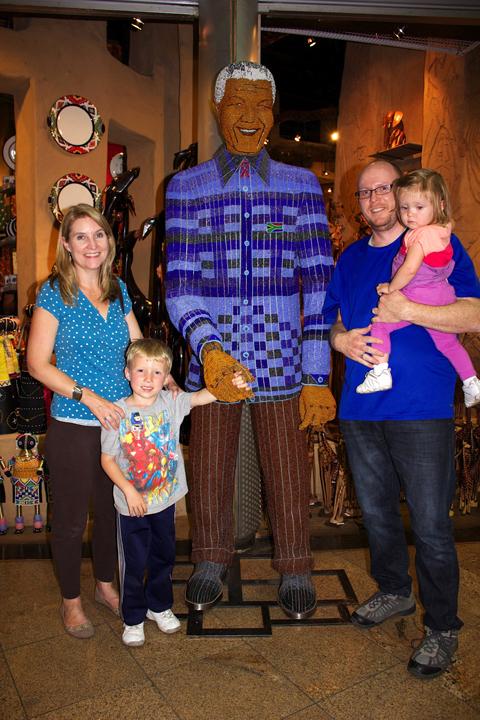Professor returns from trip
ABROAD English instructor serves as visiting researcher at South African university.
The Weaver-Hightowers, both UND professors, pose with a statue of Nelson Mandela in South Africa. Photo submitted.
Associate English Professor Rebecca Weaver-Hightower has returned to UND after spending a year abroad in South Africa where she served as a visiting researcher at Rhodes University in Grahamstown.
Weaver-Hightower’s husband Marcus Weaver-Hightower, an associate professor and chairman of educational foundations and research at UND, and the couple’s two children, Harrison, 6, and Evelyn, 2, join her for the duration of her stay.
Rebecca and Marcus Weaver-Hightower have both been teaching at UND since 2004.
The Weaver-Hightowers’ trip was cut short because of family matters. Although
Rebecca Hightower said the was a rewarding experience for her and her family, some of the not so great memories involved in the trip include their house being robbed since they didn’t have an electric fence.
The experience still proved to be valuable for Rebecca Weaver-Hightower as her main area research and teaching involves Postcolonialism of the former British Empire –— a subject on which she is writing a book.
“I was able to work with these materials and with the experts at Rhodes and in the town, as well as making valuable contacts with other scholars and indigenous people in the community,” she said.
Weaver Hightower’s soon-to-be-published book is titled “Frontier Fictions: Settler Sagas and the Origins of Postcolonial White Guilt.”
“Frontier Fictions” contains five types of stories: Stories about heroic settlers, stories about settler relationships with indigenous people, stories about the settler’s relationship with the landscape, stories about the settler’s relationship with indigenous animals and stories about settlers’ children.
The book argues these stories function like defense mechanisms, helping individual writers and the larger reading public to process and work through some of the messy and ambivalent feelings of settlement, including guilt.
The book also points out these stories legitimize the settler’s ownership of the land and deny the claims of indigenous people helped the work of settlement proceed.
Nathan Guillemette is a staff writer for The Dakota Student. He can be reached at [email protected].












